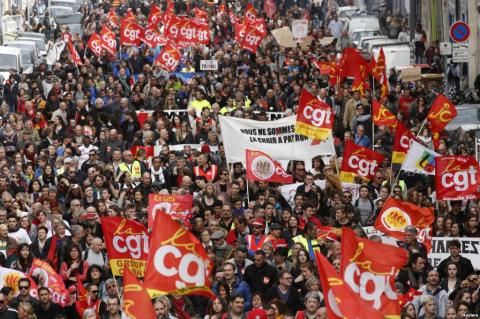MAMMOTH strikes in France have spread to the oil industry, leading to petrol shortages nationwide and adding to the government’s woes.
The El Khomri law — named after Labour Minister Myriam El Khomri — is billed in the British media as an attempt to revitalise the French economy.
As usual the reality is different.
The El Khomri law would in practice strike down France’s 35-hour week — which doesn’t mean that no-one is allowed to work more than 35 hours, but does mean that if they do they are entitled to be paid overtime rates.
Not only would this disappear where longer hours were “negotiated” by the company, but overtime rates themselves could be negotiated downward.
Other changes make it easier for management to reduce pay, lay off workers and come to their own arrangements on what maternity leave or holiday to allow.
Overall, the laws are an attack on collective bargaining, especially at national sectoral levels — bargaining formerly carried out across industries will increasingly be “devolved” to the individual company.
Much of this rotten recipe already applies in Britain. It allows a race to the bottom as employers take advantage of a fragmented workforce whose ability to call on the solidarity of workers elsewhere is strictly regulated (the “deregulation” mantra applies only to bosses, not workers and their representatives).
The idea that such measures will rectify France’s economic problems are a fantasy.
Some are directly counterproductive: unemployment is likely to rise, not fall, if smaller workforces can be made to work longer hours, while the idea that a liberalised “hire and fire” economy reduces joblessness is not just counterintuitive, it’s demonstrably wrong.
Mass unemployment in Britain today has its roots in the Thatcher era. Neoliberal economic nostrums caused the problem — they can hardly be expected to solve it.
French Prime Minister Manuel Valls’s determination to force El Khomri through — using an arcane constitutional mechanism to avoid a parliamentary vote, and now demanding a heavy-handed state crackdown on industrial unrest — is particularly perverse given Europe’s collective experiences since the economic crash of 2008.
European Union chiefs in Brussels have aggressively pursued the same “austerity” agenda as the Tories in Westminster, blaming a bankers’ crash on public spending.
They have exploited the crisis to shift wealth from working people to the super-rich through attacks on wages and pensions while privatising public assets and outsourcing services.
Just as importantly, they have worked to shift power away from ordinary people and towards corporations.
The EU’s Growth and Stability Mechanism places draconian restrictions on borrowing, tying elected governments into an ever narrower framework of acceptable policies.
Existing EU treaties such as Maastricht and Lisbon limit the power of independent states to intervene in their economies, support their own industries or extend public ownership.
Where the people have disagreed, they have been overruled. In Italy and Greece this at one stage took the form of appointed “technocrat” governments to impose the bankers’ will.
Since then governments elected specifically to oppose austerity and privatisation have instead been induced to implement them. That is as true of Francois Hollande in Paris as it is of Alexis Tsipras in Athens.
The results of austerity have been dismal. Economies have shrunk, unemployment has soared — especially in Greece, Spain, Portugal and Ireland — and workers’ wages are still lower in real terms than they were eight years ago.
Social-democrat complicity in this war on the poor has worked to the benefit of fascist parties in Greece, Austria, the Netherlands and France.
Solidarity with the French workers goes beyond the El Khomri law. It means rejecting the disastrous neoliberal experiment being imposed on our continent by the European Union.


Spread the word